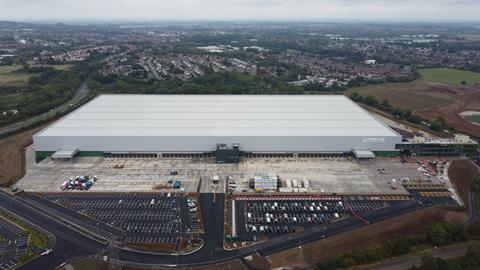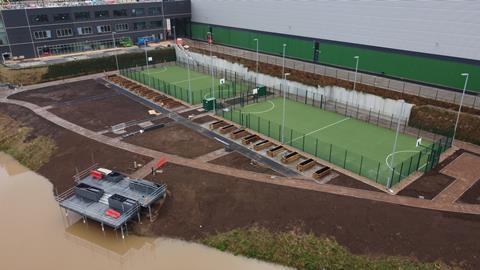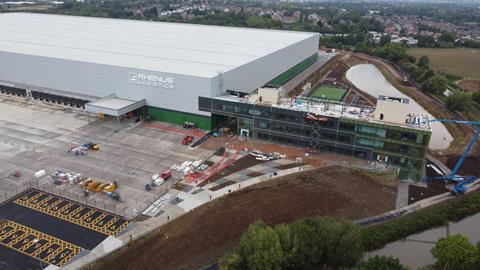Yes – says Tim Brown of Avison Young, if they achieve exemplary environmental and design performance and truly address the needs of their customers, staff and local communities

When discussing the development of logistics or industrial facilities, the image that typically springs to mind is that of a large warehouse. For most of us, our experience of such facilities is limited to driving past them at high speed on an adjacent motorway; few will ever set foot inside these vast structures, even though we increasingly depend on them for the delivery of all types of consumer goods.

The Rhenus Campus, a one million square foot logistics facility developed by Baytree in Nuneaton (on the M1/M6/M69 corridor), highlights what can be achieved when occupiers and their advisors collaborate with developers and investors. With a strong focus on environmental performance, workplace experience and social impact, it demonstrates their ability to contribute to the social fabric of towns.
Much in the way that offices have adapted to the evolving needs of employees, warehouses are being created in more appealing environments that will enhance productivity and job satisfaction. While the campus is arguably unique in the extent to which these objectives have been delivered, over the past few years there has been a significant evolution in the design and operation of warehouse buildings in the UK.
This has been driven by the need not just for bigger buildings to cope with ever-changing consumer demands but for high-quality, sustainable buildings to meet growing ESG requirements.
The Rhenus Campus exemplifies this evolution in two significant ways: through its environmental and design performance, and through its commitment to addressing the social needs of its workforce while actively engaging with the local community. By enhancing workforce wellbeing, Rhenus has taken a proactive approach to the issue of staff recruitment and retention, a common challenge faced by businesses today.
With the provision of facilities that can be used before and after work, the Rhenus Campus encourages an active lifestyle and promotes a sense of community among its staff
Employees have access to high-quality changing areas and welfare facilities, together with an external walking route linking many of the facilities, roof terraces and sensory gardens, enabling a connection to nature. Informal meeting spaces in the full-height glass atrium will provide panoramic views over the countryside.

With the provision of facilities that can be used before and after work, the Rhenus Campus encourages an active lifestyle and promotes a sense of community among its staff. It goes beyond the boundaries of its own organisation, collaborating with the local community and offering opportunities for third parties to use the site’s facilities.
Throughout the construction phase the project delivery team got involved in various charitable initiatives including regular collections for a local foodbank, providing support for Nuneaton’s local community hub (HTC) and a local hospice, as well as hosting school and nursery visits, showcasing its dedication to social responsibility.
The campus highlights how large warehouse buildings can have a positive impact on local communities by acting as good neighbours and as a valuable part of a community’s infrastructure. By promoting the social needs of employees and engaging with the local community, the campus sets an example for warehouses to become vibrant, community-oriented spaces.
This shift in perspective can help to transform warehouses from mere functional structures into valuable contributors to the social fabric of towns
This shift in perspective can help to transform warehouses from mere functional structures into valuable contributors to the social fabric of towns.
Built and fitted out to BREEAM Outstanding standards, the building will feature timber-framed offices and the project will make use of rooftop solar power generation. As investors across all asset classes focus their attention on ESG performance, and operators seek to manage energy costs, this emphasis on energy performance benefits stakeholders at every level.

The delivery of the Rhenus Campus has faced its share of challenges. From the outset, Rhenus Warehousing Solutions UK emphasised its ambitions for the development, aiming to establish new benchmarks for logistics facilities, thereby reaffirming its commitment to staff and customers.
Working alongside a forward-thinking team, the project was developed in an environment that encouraged innovative solutions that addressed these challenges.
Several of them were beyond our direct control, such as network constraints that prevented us from installing the desired level of solar power generation. So we explored alternative solutions, including innovative storage methods and the implementation of vanadium flow batteries, with a focus on futureproofing to accommodate increased generation capacity once the external constraints are resolved.
We also made an effort to learn from the project, continually monitoring emerging technologies that were considered but not integrated into the design. This research should inform other potential developments and ensure that we stay at the forefront of industry advancements.
As we approach the project’s completion and handover, we are committed to conducting a comprehensive review to evaluate the early benefits that the campus offers to Rhenus, its staff and the community. The insights gained, along with interim feedback, will be shared with others in the industry undertaking similar projects as part of our commitment to knowledge sharing and support for our clients’ endeavours.
It is important for businesses and policymakers to recognise the social value that warehouses can bring and to promote the development of facilities that foster employee wellbeing, community engagement and sustainability. By doing so, warehouses not only become more efficient in their operations but also serve as positive forces for the communities in which they operate.
Tim Brown is principal, building and project consultancy, at Avison Young London


























No comments yet